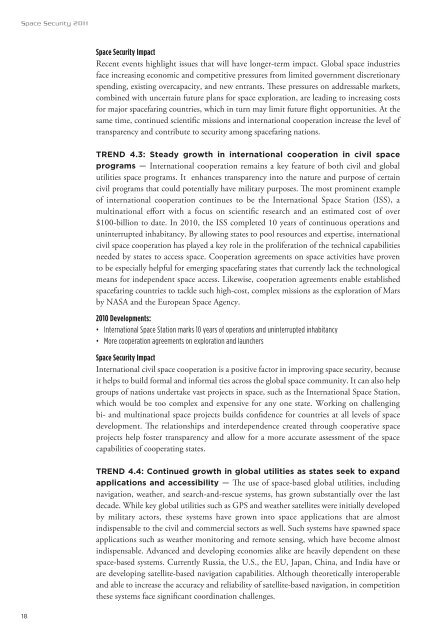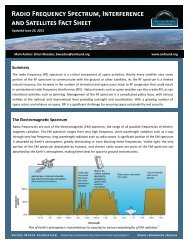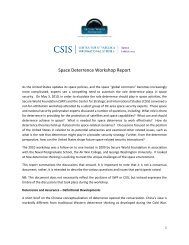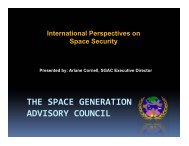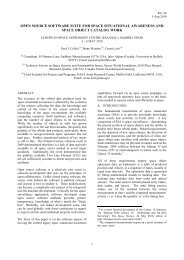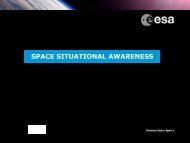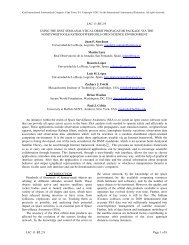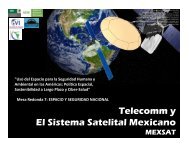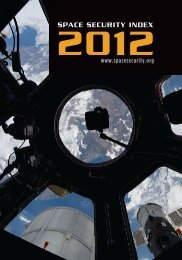Space Security Index
Space Security Index
Space Security Index
You also want an ePaper? Increase the reach of your titles
YUMPU automatically turns print PDFs into web optimized ePapers that Google loves.
<strong>Space</strong> <strong>Security</strong> 2011<br />
18<br />
<strong>Space</strong> <strong>Security</strong> Impact<br />
Recent events highlight issues that will have longer-term impact. Global space industries<br />
face increasing economic and competitive pressures from limited government discretionary<br />
spending, existing overcapacity, and new entrants. ese pressures on addressable markets,<br />
combined with uncertain future plans for space exploration, are leading to increasing costs<br />
for major spacefaring countries, which in turn may limit future ight opportunities. At the<br />
same time, continued scientic missions and international cooperation increase the level of<br />
transparency and contribute to security among spacefaring nations.<br />
TREND 4.3: Steady growth in international cooperation in civil space<br />
programs — International cooperation remains a key feature of both civil and global<br />
utilities space programs. It enhances transparency into the nature and purpose of certain<br />
civil programs that could potentially have military purposes. e most prominent example<br />
of international cooperation continues to be the International <strong>Space</strong> Station (ISS), a<br />
multinational eort with a focus on scientic research and an estimated cost of over<br />
$100-billion to date. In 2010, the ISS completed 10 years of continuous operations and<br />
uninterrupted inhabitancy. By allowing states to pool resources and expertise, international<br />
civil space cooperation has played a key role in the proliferation of the technical capabilities<br />
needed by states to access space. Cooperation agreements on space activities have proven<br />
to be especially helpful for emerging spacefaring states that currently lack the technological<br />
means for independent space access. Likewise, cooperation agreements enable established<br />
spacefaring countries to tackle such high-cost, complex missions as the exploration of Mars<br />
by NASA and the European <strong>Space</strong> Agency.<br />
2010 Developments:<br />
• International <strong>Space</strong> Station marks 10 years of operations and uninterrupted inhabitancy<br />
• More cooperation agreements on exploration and launchers<br />
<strong>Space</strong> <strong>Security</strong> Impact<br />
International civil space cooperation is a positive factor in improving space security, because<br />
it helps to build formal and informal ties across the global space community. It can also help<br />
groups of nations undertake vast projects in space, such as the International <strong>Space</strong> Station,<br />
which would be too complex and expensive for any one state. Working on challenging<br />
bi- and multinational space projects builds condence for countries at all levels of space<br />
development. e relationships and interdependence created through cooperative space<br />
projects help foster transparency and allow for a more accurate assessment of the space<br />
capabilities of cooperating states.<br />
TREND 4.4: Continued growth in global utilities as states seek to expand<br />
applications and accessibility — e use of space-based global utilities, including<br />
navigation, weather, and search-and-rescue systems, has grown substantially over the last<br />
decade. While key global utilities such as GPS and weather satellites were initially developed<br />
by military actors, these systems have grown into space applications that are almost<br />
indispensable to the civil and commercial sectors as well. Such systems have spawned space<br />
applications such as weather monitoring and remote sensing, which have become almost<br />
indispensable. Advanced and developing economies alike are heavily dependent on these<br />
space-based systems. Currently Russia, the U.S., the EU, Japan, China, and India have or<br />
are developing satellite-based navigation capabilities. Although theoretically interoperable<br />
and able to increase the accuracy and reliability of satellite-based navigation, in competition<br />
these systems face signicant coordination challenges.


